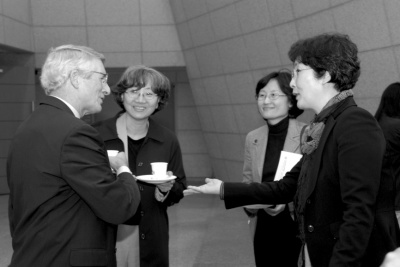“Ewha has made many attempts to promote academic exchange, but it still got a long way to go”

For the past years, the EAAS has provided “a forum for academic exchange,” said Yoo Young-eun, a researcher at the EAAS.
The EAAS also provides various faculty forums where discussions take place among participants and lecturers of different backgrounds.The government-led World Class University (WCU) Project which invites international scholars to collaborate with Korean faculty members is another attempt promoting the interchange and integration of different fields of studies. In 2009, a number of professors of Ewha, including 11 EAAS affiliated professors and their research teams were selected for nine different WCU projects.
Ewha’s drive for interdisciplinary studies is also reflected in Scranton College, which was established in March 2007 to cultivate multitalented and creative students through an interdisciplinary curriculum.
“At Scranton College, there are no walls, no borders that separate disciplines or people,” said Kim Hun-min, the Dean of the Scranton College. “We encourage students to explore a great diversity of subject matters, interacting with peers and faculty from diverse backgrounds and interests.”
Students enrolled in the Scranton Honors Program (SHP) provided by the Scranton College can select a distinctive field of study from five major tracks that integrate two or more academic disciplines.
The five major tracks are Critical and Cultural Studies; Digital Humanities; Initiatives in Social Sciences; Science, Life and Society; or Self-Designed.
Within the SHP tracks, students can select courses according to their interests.
Despite such efforts, Ewha is still taking baby-steps in the field of knowledge integration.
“Foreign universities are ahead of us in implementing effective and efficient interchange,” said Professor Choe Jae-chun (Molecular & Life Sciences).
EAAS education programs and special lectures are mostly open to graduate students and professors, and Scranton College is the only academic program of its sort at Ewha. Only 40 students per year are allowed to enroll in the SHP.
The Scranton College also limits the liberal art classes that students can register. And since there are up to six mandatory classes, in reality it is hard for a student to actually intertwine different study areas efficiently.
“The courses are already designed for students and don’t allow creativity in designing a distinctive majors for each student,” said Nam You-sun (International Studies, Scranton College 3)
“The university has made many attempts to promote academic exchange,” said Choe. “However, they were not very effective.”
Choe has helped translate a book called “Consilience: the Unity of Knowledge” in 2005. “Consilience means to come up with an ‘offspring major’ which, through active communication, integrates two or more subjects without altering the original fields of studies,” Choe said.
However, Korean cultural tendencies block such consilience.
“Professionals are reluctant to open up their majors to others,” said Professor Kim Hong-kyun (Hangyang University), one the few Korean scholars teaching Environmental Law, an integrated academic course. “This is because they do not want new competitors.”
“Many people lack an understanding of the effect academic consilience can bring,” Choe added. “Of course, the convention of different disciplines does not always end up with positive results. However, the reality is that many fail to acknowledge the synergic effects it can have.”
“Interdisciplinary study is a tremendous global trend, these days,” said Choi Kyunghee (Science Education), the Chief of the Ewha Office of Research. “It is important to understand and embrace one another in order to gain synergic effects.”

